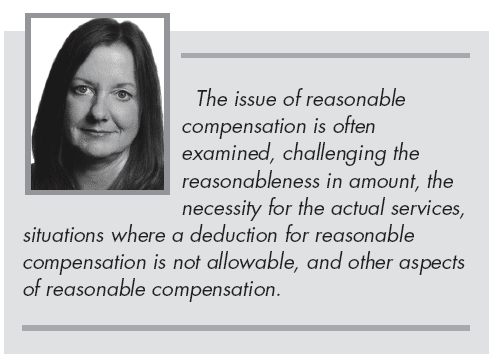Are There Holes in Your Policies? – Closing Them Is Key to Weathering an IRS Audit
The Internal Revenue Service in the Western Mass. area has added quite a few new auditors for their Small and Medium Sized Business team. This has resulted in an increasing number of audits for businesses in this area. Many of these businesses are professional-services firms, including medical practices. The issue of reasonable compensation is often examined, challenging the reasonableness in amount, the necessity for the actual services, situations where a deduction for reasonable compensation is not allowable, and other aspects of reasonable compensation.
Each medical practice should examine its compensation policies and consider the following potential issues.
The reasonable-compensation issue most frequently arises in the context of practices organized as C corporations. They have the biggest incentive for inflating owner/employee salaries in order to distribute profits as deductible compensation rather than non-deductible dividends. Salaries of stockholders will be subject to careful analysis, and if they are found to be out of proportion to the volume of business transacted, or excessive when compared with the salaries of like employees of other corporations doing a similar kind or volume of business, the amount so paid in excess of reasonable compensation for the services will not be deductible from gross income, but will be treated as a distribution of profits.
This issue would arise most often in practices with employed physicians, NPs, and PAs. The incremental profits derived from their services could be considered distributable profits unless the stockholder/employee has an employment agreement requiring direct oversight of the services provided by these employees.
In a closely held corporation, a family member can be kept on the payroll even though no services are performed. Accordingly, the IRS typically scrutinizes compensation paid to the immediate family members of the principal shareholders of a corporate employer, particularly minor children and spouses, to determine whether any services have in fact been performed. Therefore, amounts paid to family members must be defendable based upon a reasonable hourly wage and reasonable hours worked. For example, a 15-year-old child would reasonably not be expected to earn $15,000 for office work. The IRS would divide the $15,000 by an arm’s-length rate per hour, say $15 an hour, and conclude they could not possibly work 1,000 hours in a year.
In order for a compensation payment attributable to prior services to qualify for a current deduction, an employer must establish: (1) the fact and the amount of the underpayment in prior years; and (2) that the current payment is intended as compensation for past services. Proof of the fact and the amount of a prior underpayment is made by reference to the entire compensation history of the employee. The IRS may try to establish the payments to be non-deductible stock redemption payments versus deferred compensation.
The Internal Revenue Code uses the past tense in requiring that services be “actually rendered” to obtain a tax deduction. Therefore, no deduction is available for a compensation payment in respect of services to be rendered in the future. This is true regardless of whether the employer is on an accrual or a cash method of accounting. In accordance with the general rules governing the deductibility of business and investment expenses, payments for future services are deductible as compensation ratably over the period during which the services are rendered.
On the employee side, cash-basis individuals must report income in the year received. To try and counterbalance this inequity, these advance payments have been classified as loans or advances. As an example, advances by a clinic to newly hired physicians in exchange for their promises to work there for five years were held to be compensation. If the promise was fulfilled, then the debt was forgiven. There was no fixed repayment schedule, and most of the physicians had no reasonable prospect of repaying. Interest accrued over the five-year term, but no payments were required. The court found the parties didn’t intend for the advances to be repaid.
Although an employee must perform services in order to establish the employer’s right to a deduction, the actual payment of compensation may, at the employee’s request, be made to a person who performed no services, provided the assignment is made with respect to services actually performed by the person directing payment. Generally, however, the employee assigning the compensation still will be taxed as the recipient of the compensation unless such compensation was received by that individual as agent for another entity. For example, if a physician in a specialty practice performs services for another practice or health facility, and if, under their employment agreement with the specialty practice, they are required to direct these payments to the specialty practice, the amounts would not be considered compensation to them.
While this is not an all-encompassing list of the potential reasonable-compensation issues, it is a good place to start. Additional considerations would include excess or lavish expense reimbursements, consistent characterization of payments, and excess fringe benefits. With the involvement of your tax consultant and proper planning, challenges upon audit should not be an issue. v
Kristina Drzal-Houghton, CPA, MST is the partner in charge of Taxation at Holyoke-based Meyers Brothers Kalicka, P.C.; (413) 536-8510.


Comments are closed.